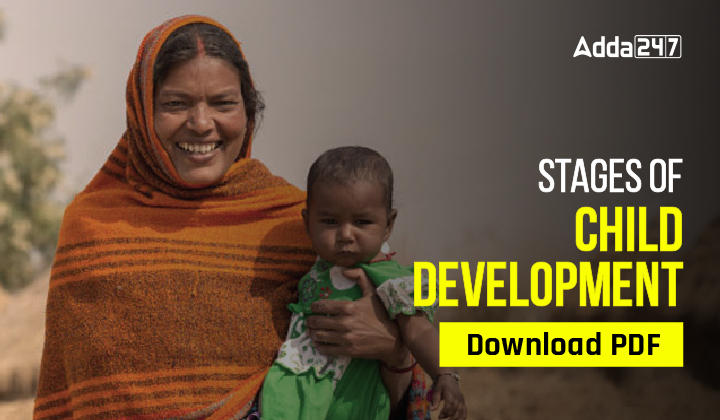Table of Contents
Stages of Child Development and Growth are an important topic of Child Development and Pedagogy (CDP which comes in teaching exams i.e. UGC NET, CTET, HTET, KVS and others. Here, we are going to explain the Stages of Child development and Growth in detail which helps students with Exam Preparation.
Stages of Child Development and Growth
Stages of development make a child physically, mentally, emotionally, and verbally developed. Development of a Child starts from birth to the beginning of adulthood. To understand child growth, we have to learn about the stages of development. Every psychologist has mentioned different stages of child development. Let’s learn about stages from birth to adulthood of development given by various psychologists. The child Development Topic is Stages of Development- Child Growth and Development.
Different Stages of Child Development (From Infancy to Adolescence)
Child development occurs through distinct stages, each marked by unique milestones and challenges. Infancy (0-2 years) focuses on rapid physical growth, sensory development, and the formation of emotional bonds. Early childhood (3-6 years) sees advancements in language, motor skills, and social interaction. During middle childhood (7-12 years), cognitive abilities expand, fostering problem-solving and academic skills. Adolescence (13-18 years) is characterized by significant physical, emotional, and social changes, including the development of identity, independence, and critical thinking. Understanding these stages helps caregivers support a child’s holistic growth and well-being.
Child Development
It refers to qualitative changes taking place in an individual simultaneously with quantitive changes of growth. Development not only represents changes in an organism physically from its origin to its death but more particularly it is the progressive changes with take place from its origin to maturity.
Stages of Child Development
The development of human beings passes through various stages. Each and every stage has different characteristics and behaviours. The characteristics of one stage differ from the characteristics of the other stage. Hence, in order to understand a child, the teacher must know these characteristics. Different psychologists have divided human development in different stages. Some of the classifications are as below.
According to Ross Child Development
The human development passes through the following stages :
| According to Ross Child Development | |
| (i) Infancy | 1 to 3 years |
| (ii) Early childhood | 3 to 6 years |
| (iii) Late childhood | 6 to 12 years |
| (iv) Adolescence | 12 to 18 years |
According to Sellay State of Development
| According to Sellay State of Development | |
| (i) Infancy | 1 to 2 year |
| (ii) Childhood | 3 to 6 years |
| (iii) Late childhood | 6 to 12 years |
| (iv) Adolescence | 12 to 18 years |
According to Kolesnic Stage of Development
| According to Kolesnic Stage of Development | |
| (i) Pre – natal | The period from conception to birth is termed as ‘pre – natal’ stage |
| (ii) Neo-natal | From birth to 3 or 4 weeks |
| (iii) Early Infancy | 15 to 30 months |
| (iv) Late Infancy | 5 to 9 years |
| (v) Early Childhood | 30 months to 5 years |
| (vi) Middle Childhood | 5 to 9 years |
| (vii) Late Childhood | 9 to 12 years |
| (viii) Adolescence | 12 to 21 years |
According to Ruch of Child Development
| According to Ruch of Child Development | |
| (a) Germinal Period | Its duration is 0 to 2 weeks. During this period, the fertilized ovum develops due to cell – division. |
| (b) Embryonic Stage | This stage lasts from 2 to 10 weeks. In this stage, the various organs of the body start getting their shapes developed |
| (c) Foetal Stage | From 10 weeks to the birth period comes under this stage. |
According to E.B. Hurlock
| According to E.B. Hurlock | |
| 1. Pre-natal Period | From conception period to birth i.e., 280 days. |
| 2. Infancy Stage | From birth to 2 weeks |
| 3. Babyhood | upto 2 years |
| 4. Childhood (a) Early childhood (b) Later childhood |
From 2 to 11 or 12 years. upto 6 years From 7 to 12 years |
| 5. Adolescence (a) Pre Adolescence (b) Early Adolescence (c) Later Adolescence |
From 11 to 13 years to 20 – 21 years. In girls, it is 11 – 13 years and in boys it is one year later. upto 16 – 17 years upto 20 – 21 years |
1000+ Important (CDP) Questions For All Teaching Exams
According to Dr. C.L. Kundu and Dr. D.N. Tutoo
| According to Dr. C.L. Kundu and Dr. D.N. Tutoo | |
| 1. Pre-natal a. Ovum b. Embryo c. Foetus |
0 to 250 or 300 days. 0 to 2 weeks 2 to 10 weeks From 10 weeks till birth |
| 2. Neonate Stage | The life period of first two weeks just after birth |
| 3. Infancy | First two years after birth |
| 4. Early Childhood | 2 to 6 years |
| 5. Middle Childhood | 6 to 10 years |
| 6. Late Childhood | 10 to 13 years 1 |
| 7. Puberty | In girls it is in 12 years, boys in 14 years |
| 8. Early Adolescence | 13 to 15 years |
| 9. Later Adolescence | 15 to 20 years |
| 10. Adulthood and old age | From 20 years to the end |
According to Jones of State Development
| According to Jones of State Development | |
| (a) Infancy | From birth to 5 years |
| (b) Childhood | 6 to 12 years |
| (c) Adolescence | 13 to 19 years |
| (d) Adulthood | Above 20 years |
Stages of Child Development and Growth PDF Notes
Candidates preparing for Teaching Exams can easily access the Stages of Child Development and Growth Notes PDF file from the link provided below. They can refer to the PDF as a reference during preparation and most importantly during revisions.
Download Stages of Child Development and Growth




 Phases of Teaching - Stages of Teaching ...
Phases of Teaching - Stages of Teaching ...
 स्वर व व्यंजन - �...
स्वर व व्यंजन - �...
 UP TGT Sanskrit Syllabus and Exam Patter...
UP TGT Sanskrit Syllabus and Exam Patter...




